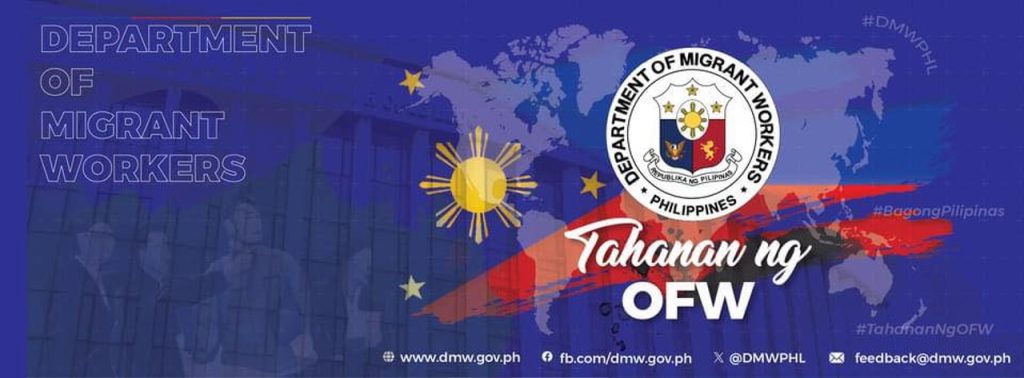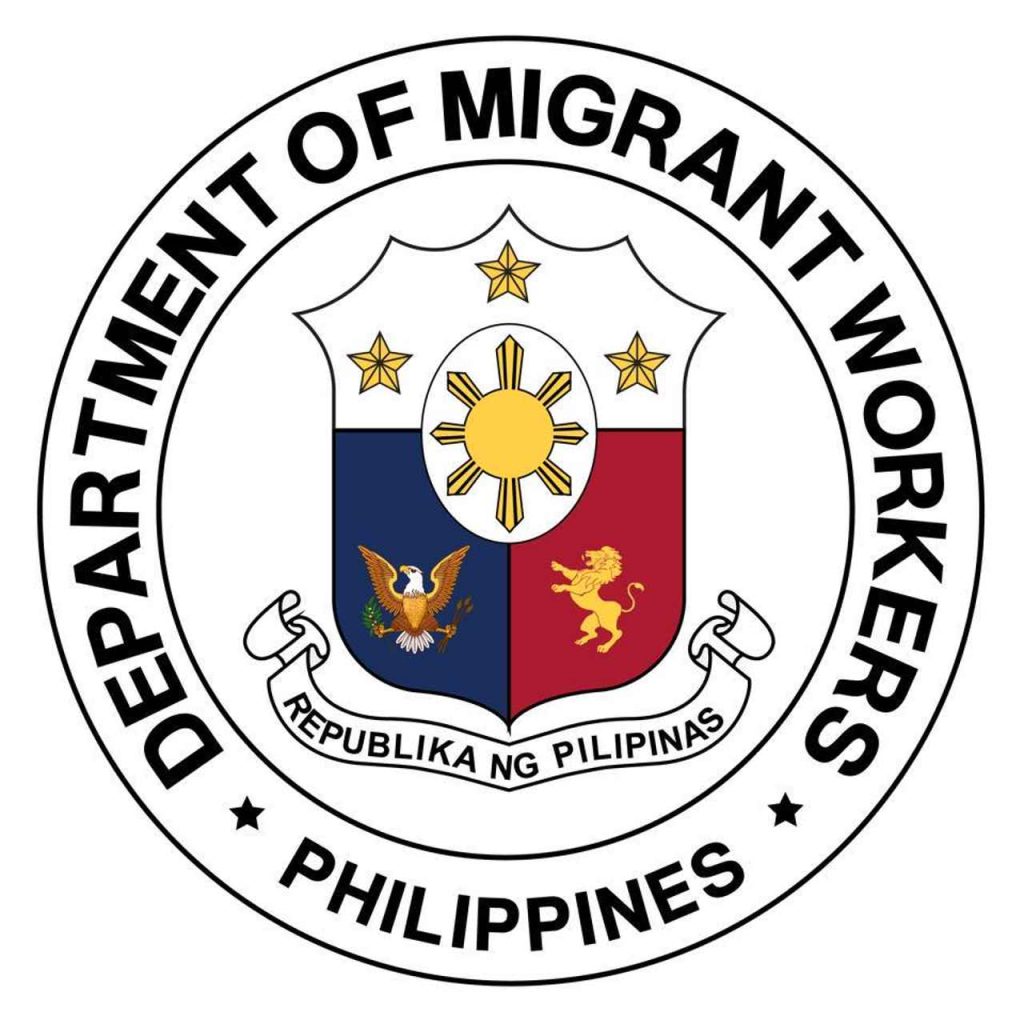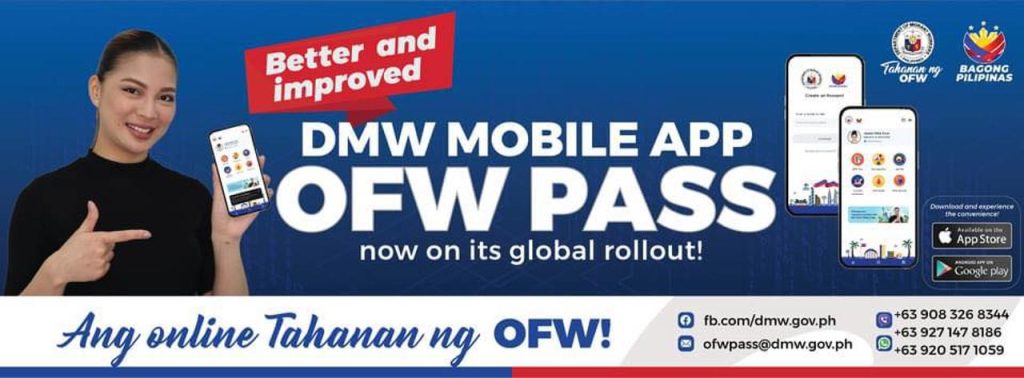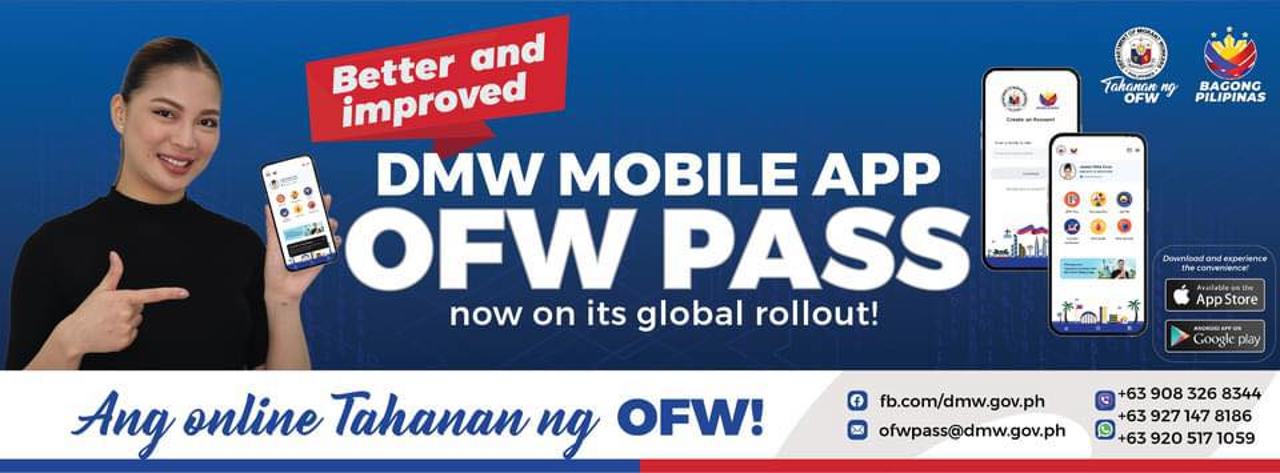The Department of Migrant Workers (DMW) is a dedicated platform of the Philippine government specifically created to protect and help the Filipinos who are working abroad, otherwise known as Overseas Filipino Workers (OFWs). It is a relatively new specialized agency dedicated to supporting and safeguarding only the rights of OFWs, ensuring they receive proper protection and cash assistance and other support system throughout their employment journey.
As an agency, the DMW’s main mission is simple: To ensure the rights and welfare of OFWs are safeguarded, no matter where they work. By working closely with other national programs, the DMW also contributes to the broader development goals of the country. To learn more about what these things are exactly and how the DMW does it, then keep reading this article.
What is DMW?
The DMW stands for the Department of Migrant Workers. It was established by the DMW Act (Republic Act No. 11641), signed into law on December 30, 2021, and became effective on February 3, 2022, under the administration of President Rodrigo Duterte.
The DMW then took over the responsibilities of several other agencies, including the old Philippine Overseas Employment Administration (POEA), as well as the Office of the Undersecretary for Migrant Workers’ Affairs (OUMWA) of the Department of Foreign Affairs (DFA), Philippine Overseas Labor Office (POLO), International Labor Affairs Bureau (ILAB), National Reintegration Center for OFWs (NRCO), the National Maritime Polytechnic (NMP) of the Department of Labor and Employment (DOLE), the Overseas Workers Welfare Administration (OWWA), and the DOLE-MCI to streamline services specifically for OFWs, particularly the distressed ones.
The DMW, as a dedicated agency for the modern-day heroes we call OFWs, is responsible for managing the deployment of migrant Filipino workers overseas and for ensuring their safety and fair treatment in foreign countries. Their job also includes helping them find safe employment abroad, supporting their reintegration when they return to the Philippines, and providing ongoing skills training. It also helps returning OFWs transition back into the Philippine workforce or community. The department also helps OFWs stay more competitive and better prepared for opportunities abroad, should they decide to leave again.

History
The idea for the DMW began as a commitment made to Overseas Filipino Workers (OFWs) during a 2019 celebration honoring them. Following this, several lawmakers proposed bills to establish a new department specifically for Filipinos working abroad, which underwent various revisions. These efforts culminated in the passage of Senate Bill No. 2234, leading to the creation of the DMW under Republic Act No. 11641.
Logo

The logo of the Department of Migrant Workers (DMW) of the Philippines is circular, featuring a central shield with significant national symbols, surrounded by the department’s name and establishment year.
1. Central Shield Design
- The shield is divided into three sections with distinct colors: blue on the left, red on the right, and white at the top.
- The blue section on the left contains an image of a Philippine eagle, symbolizing strength, courage, and freedom.
- The red section on the right features a lion, representing bravery and valor.
- The white section at the top showcases three yellow stars and a sun with eight rays, representing the three main geographical regions of the Philippines (Luzon, Visayas, and Mindanao) and the provinces that first rose against Spanish colonization, respectively.
2. National Motto
- Below the shield is a banner with the text “Republika ng Pilipinas,” reflecting the logo’s alignment with national identity and sovereignty.
3. Circular Text
- The circular band surrounding the shield contains the text “Department of Migrant Workers” at the top and “2022” at the bottom, indicating the establishment year of the department. This encircling text signifies the department’s role in protecting and overseeing the welfare of Filipino migrant workers.
Overall, the DMW logo represents the department’s commitment to the protection, support, and empowerment of Overseas Filipino Workers (OFWs), symbolized through the use of national elements that evoke strength, bravery, and unity.
Mission
The DMW operates with the following mission:
“We commit to empower our migrant workers through digital transformation of our processes and ensuring sustained ease of doing business.
We shall manage a national reintegration program to enhance their skills, knowledge and competence, and facilitate their safe and productive reintegration in their communities.”
Vision
The main vision that the DMW hopes to achieve is summarized in this vision statement:
“The DMW is the exclusive home in government of our OFWs and their families that protects their rights, promotes their welfare, and unleashes their potential to fulfill their destiny as co-architects of national economic development.”
Core Values
The core values of the DMW are the principles that guide its actions and decisions and shape how the organization treats its people and carries out its work. These core values observed by the DMW helps them provide the best support and care for the so-called modern-day heroes.
- Compassion: The DMW cares deeply about OFWs and their families, recognizing their hard work and sacrifices by supporting them in every possible way.
- Integrity: The department acts with honesty and strong moral principles so OFWs can learn to trust that they will always do what is right.
- Transparency: The agency is open and clear about what they need to do, making sure all OFWs and their families know how and why decisions are made.
- Excellence: The DMW promises to always aim to do their best in every task, ensuring their services improve the lives of OFWs and their families.
- Service: Everything that the DMW does is focused on helping OFWs—the main reason for their work, and is dedicated to serving them in every way.
Mandate
Here’s what the DMW does in simple terms:
- The DMW’s main job is to protect the rights and well-being of Filipinos working in other countries, no matter how they got there.
- The DMW now does the work that used to be done by seven different government agencies, making things simpler and more organized.
- The DMW helps Filipinos who want to work overseas by making sure they get good, safe jobs.
- When OFWs return home, the DMW helps them find ways to reintegrate or settle back into life in the Philippines.
- The DMW ensures that Filipinos working abroad have the skills they need by offering continuous training and development opportunities.
- The DMW coordinates with other national programs to make sure everything they do fits into the bigger plan for the country’s development.
Powers and Functions
To carry out its mandate, the Department is expected to function as follows:
- Make and follow rules to protect OFWs, help when they have problems, and help them fit back into life in the Philippines when they return.
- Control overseas job hiring
- Fight against illegal recruitment and trafficking
- Take care of OFW families
- Work with other countries and other agencies to protect and support OFWs.
- Negotiate international agreements with other countries about labor migration.
- Speak for OFWs globally, with permission from the President and DFA.
- Provide training and job matching to help Filipinos become competitive OFWs.
- Share information and create a digital database to improve services for OFWs.
- Regulate recruitment agencies to ensure they protect OFWs.
- Promote good recruitment practices and legal standards.
- Set up emergency help for OFWsin the form of a 24/7 center for emergencies involving OFWs and their families.
- Take over related agencies.
- Provide proper insurance coverage for OFWs
- Train employees for overseas work, focusing on the customs and laws of those nations.
- Study migration and development to better understand global changes.
- Assess risks in other countries and prepare evacuation plans if needed.
- Blacklist human traffickers and share this information with other relevant agencies.
- Do other important and relevant tasks to meet the goals of this law.
In doing all these tasks, the Department must respect the independent foreign policy and the DFA’s role in foreign relations. The DFA will continue to assist other Filipinos abroad who are not covered by this law.
DMW Organizational Structure
The DMW is organized to effectively manage migrant labor affairs. Here’s a breakdown of their org chart and the functions of each division:
- Office of the Secretary (OSEC): Oversees the entire department, ensuring efficient service delivery.
- Internal Audit Service (IAS): Conducts audits to ensure compliance with government regulations.
- National Maritime Polytechnic (NMP): Provides training for Filipino seafarers.
- Migrant Workers Training Institute (MWTI): Develops leadership and cultural training for DMW staff.
- Legal Service (LS): Handles legal matters, including recruitment violations.
- Strategic Planning and Management Service (SPMS): Manages corporate planning and operations.
- Strategic Communication Service (SCS): Manages public relations and stakeholder engagement.
- Finance Service (FS): Oversees budgeting and financial operations.
- Human Resource Management and Development Service (HRMDS): Manages personnel policies and staff development.
- Administrative Service (AS): Handles general support tasks like procurement and records management.
- Management Information and Technology Service (MITS): Manages ICT systems and data.
- Migrant Workers Offices Operations Support Bureau (MWOOSB): Supports global migrant worker offices.
- Pre-Employment and Government Placement Bureau (PEGPB): Develops pre-employment policies and manages government labor placements.
- Land-Based Accreditation Bureau (LAB): Accredits land-based employers.
- Sea-Based Accreditation Bureau (SAB): Accredits employers in the maritime sector.
- National Reintegration Center for OFWs (NRCO): Develops reintegration programs for returning OFWs.
- Licensing and Regulations Bureau (LRB): Manages licensing for recruitment agencies.
- Adjudication Bureau (AB): Handles cases related to recruitment violations.
- Migrant Workers Protection Bureau (MWPB): Investigates illegal recruitment and trafficking cases.
- International Migrant Workers Policy and Coordination Bureau (IMWPCB): Develops labor migration policies and engages with international organizations.
- Foreign Stakeholders Relations and Engagement Bureau (FSREB): Engages with foreign employers to ensure ethical recruitment.
- Institute for Advanced and Strategic Studies on Migration and Development (IASSMD): Conducts research on migration to inform policies.
- Regional Offices (ROs): 16 offices provide services to OFWs at the regional level.
The department is designed to be efficient, with clear divisions for specific tasks, all aimed at protecting and supporting overseas Filipino workers.
Benefits
Establishing the Department of Migrant Workers (DMW) provides comprehensive support and protection for overseas Filipino workers (OFWs). Key benefits include:
- Centralized OFW Services: Streamlines and consolidates all services related to migrant workers under one department.
- Enhanced Protection: Strengthens legal protection against illegal recruitment and human trafficking.
- Focused Policy Making: Develops and implements policies specifically aimed at improving the welfare of OFWs.
- Specialized Training: Offers targeted training and development programs for OFWs and maritime personnel.
- Improved Reintegration: Provides dedicated programs to assist OFWs in reintegrating upon their return to the Philippines.
- International Collaboration: Facilitates stronger engagement with international organizations and foreign employers to ensure ethical labor practices.
Coverage
The Department of Migrant Workers (DMW) offers essential programs and services designed to support migrant workers and their families. Through its specialized services, the DMW ensures the well-being, rights, and development of OFWs across various aspects of their lives.
- Migrant Workers: Receive counseling, legal services, and training programs to protect their rights and improve working conditions.
- OFW Families: Benefit from support programs that ensure fair treatment and access to essential services while their loved ones are abroad.
- Prospective OFWs: Experience streamlined document processing and clear guidance through a consolidated department, making their transition smoother.
- Government Agencies: Gain improved coordination and efficiency in addressing OFW needs through the DMW’s centralized structure.
Programs and Services
The Department of Migrant Workers (DMW) offers a range of services to support Filipino migrant workers, including:
1. Livelihood Programs
The DMW provides funding, training, and marketing assistance to help Overseas Filipino Workers (OFWs) start or expand their businesses.
- Livelihood Programs for OFWs (LPO)
2. Training Programs
The department offers training in entrepreneurship, financial management, and other skills to help OFWs build successful businesses and reduce dependence on their families.
3. Career Counseling
OFWs receive guidance on finding new employment opportunities or transitioning to a new career when they return to the Philippines.
4. Legal Assistance
The DMW helps OFWs with employment-related issues, including contract disputes, violations, and other concerns such as recruitment, deployment, and protection from abuse.
5. Welfare Services
The department provides support during medical emergencies, helps stranded OFWs, and offers financial assistance to the families of deceased or disabled OFWs. Emergency funds are also available for OFWs who need to return home due to personal or natural disasters.
6. Information and Legal Advice
OFWs receive information on their rights and responsibilities and legal advice on employment contracts, salary issues, and other concerns.
7. Overseas Employment Services
The DMW assists OFWs in finding jobs abroad through its Overseas Employment Services Office (OESO) under the Overseas Workers Welfare Administration (OWWA).
8. Online Services
The DMW offers various online platforms to make it easier for OFWs to access services, including:
- Pre-Employment Orientation Seminar (PEOS)
- DMW e-Registration System
- DMW OFW Records Online Appointment System
- Balik-Manggagawa (BM) Processing
- Direct-Hire Processing
- DMW Online Helpdesk
- Online Recruitment Authority Application
9. Additional Services
The DMW assists in processing documents, monitoring employment conditions, providing counseling and repatriation support, and investigating complaints of abuse and exploitation.
The DMW also collaborates with host governments, employers, and other stakeholders to protect and promote the welfare of Filipino migrant workers.
Video: Department of Migrant Workers Explained
To better understand what the DMW does and some of the services it offers, watch this video from Pinoy in England – PIE today.
Summary
The DMW is a department committed to ensuring the protection, well-being, and success of OFWs worldwide through a wide range of programs and services. It’s relatively new, but has already consolidated several other existing agencies in an attempt to make the OFW services better and more accessible in one place. With the creation of the DMW, OFWs will no longer need to get confused about which department to reach out to in cases of emergencies.
Contact Information
To learn more about how the DMW can support you or your loved ones who are working abroad, explore the full range of their services and reach out to them today.
Department of Migrant Workers (DMW)
Office Address: Blas F. Ople Building, Ortigas Ave., Cor. EDSA Ave., Mandaluyong City
Telephone Number: 8-722-11-44 / 8-722-11-55
One Repatriation Center (Hotline): 1348
Email Address: connect@dmw.gov.ph (General Inquiry); repat@dmw.gov.ph (Request for Assistance/Repatriation), assistance@dmw.gov.ph; feedback@dmw.gov.ph (Feedback and Suggestions)
Website: https://www.dmw.gov.ph/
Official Facebook Page: https://www.facebook.com/dmw.gov.ph
Official X Page: https://x.com/DMWPHL

